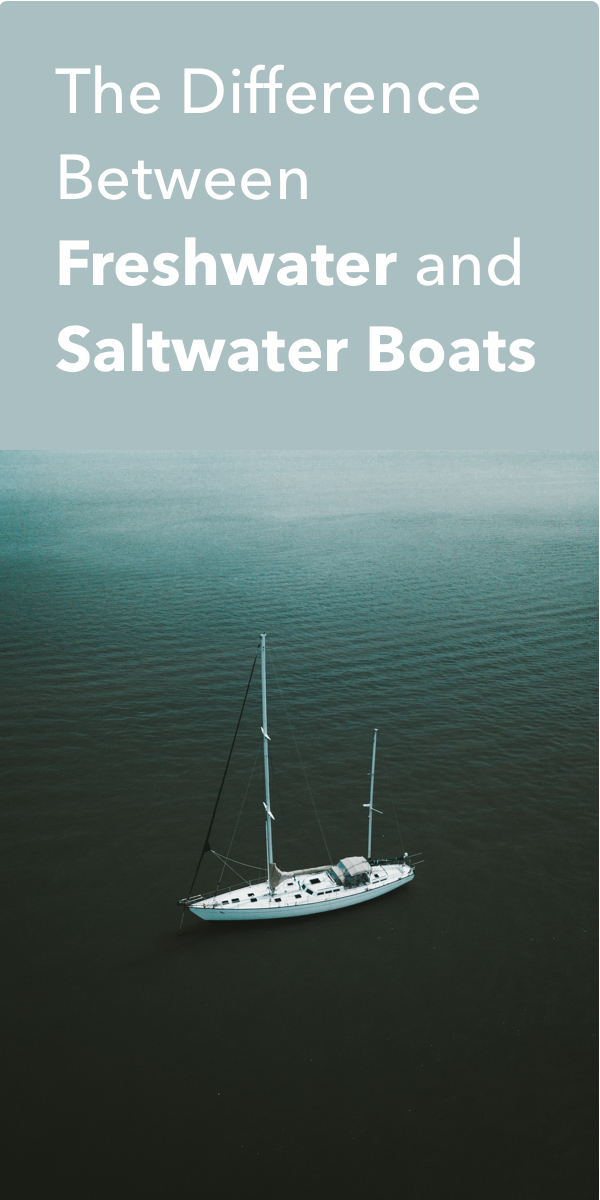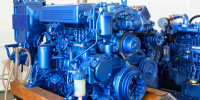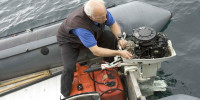The Difference Between Freshwater and Saltwater Boats
When buying your first boat, there's a lot of information to process. The most important question I had is whether it matters if I buy a freshwater or saltwater boat. So I did some research to find out where they differ.
What's the difference between freshwater and saltwater boats? Saltwater boats have systems to better deal with salt corrosion, like a closed cooling system and Mercathode system. They don't differ in hull type or material. Some people refer to offshore boats as saltwater boats. These have a different hull shape and a keel (fin) that's suitable for offshore sailing.
It's noteworthy that people mean different things when they say 'saltwater'. Also, using your boat in either salt or freshwater means you have to maintain them in a different way. Let's find out why that is.

Saltwater vs. Freshwater
Freshwater is inland water. Saltwater is seawater and it contains a lot more salt.
Boats that are in saltwater mainly have to deal with salt corrosion, but other than that, there's no real difference. Generally, a saltwater boat doesn't have a different hull shape and doesn't use other materials.
But because of the salt, saltwater boats corrode more quickly than those in freshwater. Salt eats away at iron and aluminum. If saltwater runs through the engine you get to deal with galvanic corrosion: which simply means the engine dies. Saltwater in an engine will reduce performance and ultimately block it.
Especially engine parts such as the block, exhaust, manifolds, and driver and rise system are affected by saltwater. Luckily, there are plenty of systems to deal with the extra corrosion (more on this later).
They also suffer of hull fouling or bottom fouling. Hull fouling is the growth of marine organisms on the hull. It can cost a lot of money and effort to clean up, so that's not good. This is a major problem for boat owners in warm water ports especially. Barnacles that grow on the hull can slice open the bellows, which isn't great also.
Mostly, the terms 'freshwater' or 'saltwater' refers to the boat's history. Boats that have seen salt are believed to fall apart instantaneously (which of course isn't true at all). But still, they are less likely to sell quickly. Calling a boat freshwater to get a better price is marketing, plain and simple. A well maintained saltwater boat is just as good as a freshwater boat, and sometimes better if the freshwater one isn't maintained at all.
To be completely clear: some people call offshore sailing boats 'saltwater boats'. They mean something completely different. Offshore sailing boats have a different hull shape: they have a keel that makes them more stable in larger waves.
Using a boat that is build for inland water out on sea can be dangerous. It's just not stable enough. So make sure you don't confuse these terms (many people do). If you're looking for a 'sea boat', simply get the right hull type (one with a keel), and you'll be fine. It doesn't matter if it's been in salt or freshwater.
Can a Freshwater Boat Be Used in Saltwater?
You can use a freshwater boat in saltwater just fine. If you haven't upgrade your boat for saltwater use you have to keep some things in mind to avoid unnecessary corrosion.
- Make sure you flush the engine with freshwater after you're done
- Also hose down the boat with freshwater thoroughly. Any salt that remains on the hull or parts will start to eat them away
Let's say you decide to get the boat out of the salt ASAP (directly after your trip). You hoist it onto your trailer. That's probably a good idea. There's a catch though. Salt is so aggressive on iron, it will get into places you can't really clean. It starts to slowly eat away your trailer as well. So I encourage you to hose down your trailer after each trip as good as you can.
If you're talking about using an inland sailboat offshore (I'm talking bluewater sailing here): I wouldn't recommend it. They can't cope with large waves and the risk of capsizing is too great. But: some sailboats that are designed for inland use have a keel you can lower if needed (my Cornish Crabber had one). You can use these in coastal waters as well. This is great in my opinion.
How to Deal With Saltwater Corrosion
For starters let me first say that saltwater corrosion isn't the end of the world. As I said, there are plenty of ways to deal with salt corrosion. As a matter of fact, you can convert you're own boat for saltwater use. Using a boat in saltwater requires better maintenance in general. So if done right, it will probably increase the lifespan of your boat. But it also costs a pretty penny.
The first thing you should do is probably to upgrade the systems. I encourage to take a better look at the following upgrades and systems:
- installing a closed cooling system, or, if necessary, replacing the engine (more on choosing an engine later)
- installing a Mercathode system - running electric current through your engine (I'll explain later on)
- installing freshwater flush system for the engine (if you're not getting the closed cooling system)
- replacing fasteners with stainless or anodized (coated) alternatives
To deal with the bottom fouling of saltwater you want to apply a layer of anti-fouling paint to your hull. Anti-fouling paint is an underwater hull paint made to protect from corrosion. If you leave your boat throughout the season, even in freshwater, I'd recommend to use it.
What's a Mercathode system? A Mercathode system is a cathodic protection system that runs a tiny electrical current through your engine block and outdrive. The electric current is used to stop galvanic corrosion metal parts that are submersed.
Choosing the Right Engine
If you plan on using your boat in saltwater permanently you should pay close attention to your engine. Remember this one thing:
Avoid I/O engines with raw water cooling at all cost!
Inboard with closed cooling (or a cheap outboard) is the way to go.
There are basically three types of engines:
- Outboard engines
- Inboard engines
- I/O or sterndrive engines - has the propellor on the outside, the engine block lies below deck
These engines can use two types of cooling systems:
- 'raw water' cooling system
- closed cooling system (best option)
Raw water simply means the engine uses the water you're sailing in to cool the engine. If this is saltwater, salt comes into the engine. Salt will cause galvanic corrosion, which basically means the engine will ultimately die. But first, it will perform less and less, until it blocks.
I/O’s with raw water cooling are the worst combination for salt water usage. If you use a raw water cooling system, you should expect to have to replace your risers and manifolds every 6 years (on average). It's expensive. It will cost you roughly $5,000, depending on availability of parts and cost of labor of course.
An inboard with closed cooling is generally the best option for permanent saltwater use. Closed cooling means the engine uses a closed system for cooling. So it uses its own cooling fluid. It doesn't use the saltwater for cooling, which means it doesn't have a chance to corrode the engine.
Outboard engines don't have closed cooling systems, inboard engines do.
However, an outboard engine can be alright for occasional saltwater use, since you can lift them out of the water if you're not using them. So even if you keep your boat in a saltwater marina, your engine wouldn't be in salt all the time. But you do need to flush it, otherwise you still end up with costly maintenance every couple of years.
Please note: closed cooling systems come in two types. One only runs coolant through the block, but not the exhaust manifolds and risers. The second also uses closed cooling for the exhaust. The second option is the best option. Otherwise, you'd still need to replace the manifolds and risers every six years.
Related Questions
Can you run a saltwater motor in freshwater? You can run a saltwater motor in freshwater without problems. Every engine type with closed cooling system can run in either salt and freshwater. If you use an engine with raw water cooling in saltwater, be sure to flush it with freshwater after use.
How to tell if a boat has been in salt water? Look under the exhaust flaps for rust. Rust is the best indicator for saltwater use. Salt also forms a white film in corners and on nuts and bolts. If the boat comes on a trailer, you could also check the trailer for rust. An old boat on a new trailer might indicate saltwater use as well.
Can all boats go in the ocean? It's not recommended to use inland boats on open seas. Boats for offshore use have a different hull shape and a keel (fin) to provide stability and deal with larger waves and stronger current. An inland boat isn't stable enough for ocean use and might capsize. Also, engines with raw water cooling corrode in salt water.

Did you find the answer to your specific question?
👍 16 👎 2



Comments
Bill
Hey Shawn, great article. I currently own a 2002 30’ Regal cabin cruiser with twin raw water cooled gas engines. I boat in a freshwater lake but it’s getting boring. I want to start boating along the intercoastal waterway in the Kemah Texas area. Since I live 1 hour from the coast, I want to be able to keep the boat at a slip at the marina in order to sleep on it on weekends. Ideally I would buy a boat equipped for salt water exactly as you described. I would even argue that diesel is better than petrol. However I can’t seem to find a sleepable boat less than 30’ that is equipped for salt water as you describe, except for a sail boat. I’m not into sailing. I want to cruise slowly and have a small enough boat to easily pull up to restaurants. The only cruiser boats equipped for salt water seem to be 34’ or bigger. What a shame. Do you think I can really convert my existing boat for a salt water slip and usage?
Shawn Buckles
Hi Bill,
Bigger isn’t always better - I agree.
Yes you definitely can. However, make sure your hull design is also suitable for coastal waters. The tide and wind will be a lot stronger. So a well-built hull is very important.
Raw water cooled engines are better, since you can more easily clean them. However, saltwater will greatly reduce the life span of your engine. Check out my article on marine diesel life expectancy here:
https://improvesailing.com/tips/life-expectancy-of-marine-diesel-engine
Good luck with your decision and thanks for the compliment.
Challenger Marine Exhaust
Hey, nice site you have here! Keep up the excellent work!
Leave a comment